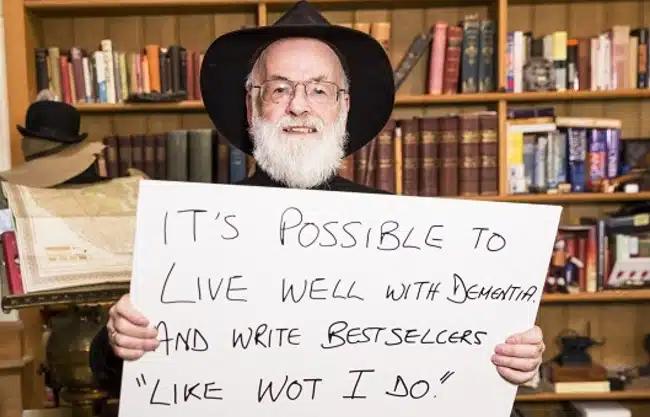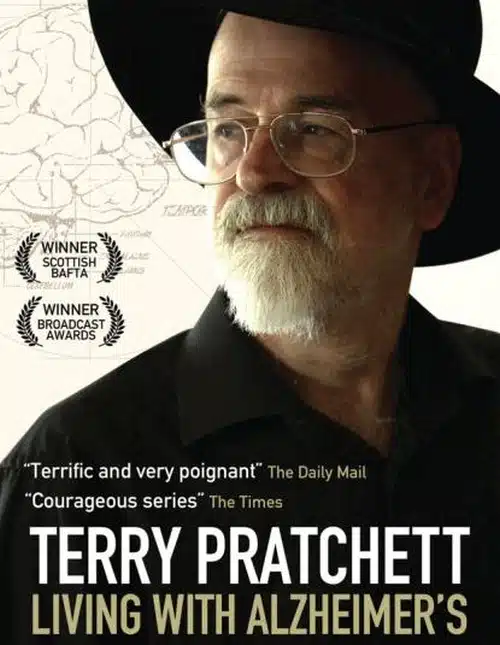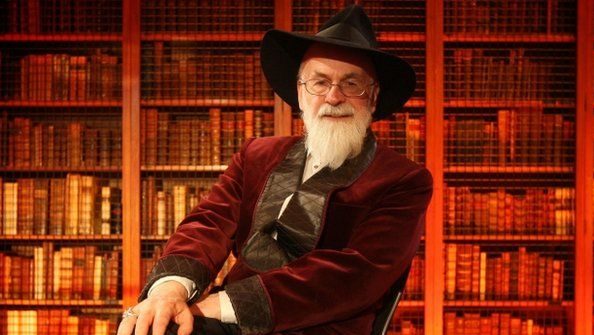
Sir Terry Pratchett and posterior cortical atrophy (PCA)
In 2007, one of Britain’s biggest and most-loved authors, Sir Terry Pratchett, announced to the world’s media that he had been diagnosed with young-onset Alzheimer’s disease known as posterior cortical atrophy (referred to as PCA).
The announcement caused a international media sensation, but what seemed most shocking was the fact that Sir Terry was only 59 at the time of his diagnosis, disproving the widely-held myth that dementia only happens to people much older in their 70s and 80s.
Posterior cortical atrophy is a rare form of dementia that starts much earlier than most other types, with an average diagnosis happening to people in their mid-50s and 60s. Today, the Alzheimer’s Society estimates that there are an estimated 42,000 people in the UK living with a form of dementia diagnosed before the age of 65.
Who was Sir Terry Pratchett?

A prolific and diverse author who published his first book (The Carpet People) at seventeen, Sir Terry Pratchett became a one-man publishing sensation with his long-running series of Discworld books, which would go on to sell in excess of a 100 million copies around the world.
Though often wrongly or dismissively labelled as just a ‘Fantasy author’, Sir Terry Pratchett is best described as equal parts satirist, humourist and all-round social observer in much the same vein as his heroes: G.K. Chesterton, P.G. Wodehouse and Charles Dickens.
A fierce campaigner and advocate

Sir Terry would seek a diagnosis in late 2007 after a series of disorientating incidents, culminating in an upsetting episode where he could not locate the ‘S’ key on his keyboard that lay in front of him.
After hearing the life-altering diagnosis from his local GP, Sir Terry quickly decided that as a public figure he would not hide his condition from the world – he was not ashamed.
As part of his public announcement of his diagnosis, Sir Terry would make a bold statement by donating $1 million to Alzheimer’s research and calling for others to do the same.
From thereon, Terry became a fierce campaigner for funding reform for Alzheimer’s research and became a respected advocate for those living with the condition.
Sir Terry would meet Prime Minister Gordon Brown in 2008 to discuss the issues facing people living with dementia and their families, presenting him with a 20,000-strong petition calling for further funding from the government.

In 2009, Sir Terry took part in a two-part fly-on-the-wall BBC documentary Terry Pratchett: Living with Alzheimer’s, where a camera crew followed him and his personal assistant (and later business manager) Rob Wilkins as they came to terms with Terry’s diagnosis. Terry spoke to people with living with Alzheimer’s, explored the science behind his diagnosis and looked at some of the recent technological development to help people living with the condition.
The Living with Alzheimer’s documentary was a great success with audiences and critics alike, who praised the unique way that Sir Terry approached the subject with honesty and his trademark good-humour. Living with Alzheimer’s would later win a prestigious Scottish Bafta for Best Factual Series.
A life well lived
In the following years, Sir Terry continued to work vivaciously, writing bestsellers, giving interviews and making public appearances.
Sadly, shortly after finishing what would become his final book, The Shepherd’s Crown, in early 2015, Sir Terry died, ‘surrounded by his family, with his cat sleeping on his bed’.
Tributes came in from every corner of the world – from his thousands of devoted fans, to high-profile public figures, and stars of the literary world.
Within 24 hours of his passing, fans had raised almost £40,000 for the Alzheimer’s charity, The Research Institute for the Care Of Older People (Rice), whom Terry had supported.
Following Sir Terry’s death, the Alzheimer’s Society paid tribute to their great champion:
Sir Terry Pratchett fundamentally changed the way dementia is seen and understood. The most passionate of campaigners to bring change; his vehement determination to reduce the stigma of dementia meant he helped drag it out of the shadows – kicking and screaming at times. He has made a remarkable contribution to dementia since his diagnosis in late 2007.
Shouting from the rooftops about the absurdity of how little funding dementia research receives, and fighting for good quality dementia care, he was and will remain the truest of champions for people with the condition.
When thanked for his work, he’d simply smile and shake his head modestly, insisting it was nothing. Never dwelling on his own dementia, he used his voice to shout out for others when they could not.”
A personal reflection

For me, Sir Terry Pratchett was as an immensely talented writer who observed all of life’s great social foibles and turned them on their head!
As a best-selling author and public figure, he used his platform for good – showing the world that you can still live a fulfilling life with a dementia diagnosis.
I never met Sir Terry but if I did, I just tell him, ‘thanks for everything’.
I’d like to finish this blog with a quote from his one his most popular Discworld books:
No one is finally dead until the ripples they cause in the world die away, until the clock wound up winds down, until the wine she made has finished its ferment, until the crop they planted is harvested.
The span of someone’s life is only the core of their actual existence.”
Reaper Man, Terry Pratchett
